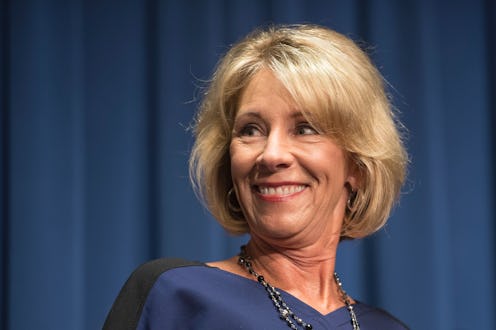News
Betsy DeVos Slashed 72 Rules Protecting Students With Disabilities Because They’re “Unnecessary”

On Friday, the Office of Special Education and Rehabilitative Services shared a newsletter that sparked outrage among some observers. The newsletter announced that 72 disability memos had been rescinded by Betsy DeVos, the Department of Education secretary. These were major guidance documents meant to help and protect the rights of students with disabilities.
The two main legislative acts under attack are the Individuals with Disabilities Education Act, otherwise known as IDEA, and the Rehabilitation Act, VICE reported. According to the newsletter, the memos that related to those two acts were "outdated, unnecessary, or ineffective."
But soon after the rescinding of the rules was announced, the education secretary came under fire from prominent political figures, such as Virginia Rep. Bobby Scott.
Scott is the top Democrat on the House Committee on Education and the Workforce, and was among one of the chief critics of DeVos's move. In a press statement, Scott described the rollback as "another harmful regulatory reform step" and said that he was "deeply concerned" with the direction the Department of Education was taking.
"This rescission is the latest in a series of disturbing actions taken by the Trump Administration to undermine civil rights for vulnerable Americans," Scott said. "Much of the guidance around IDEA focused on critical clarifications of the regulations required to meet the needs of students with disabilities and provide them a free, appropriate public education in the least restrictive environment."
He added, "We must keep protections in place in order to provide clarity for educators working to serve our must vulnerable students."
Among the 72 memos are critical policy documents that provide guidance, as Scott noted in his statement, for the rights of students with disabilities. Other observers of the recent rollback also expressed concern over the most recent step taken by DeVos.
The Washington Post spoke with Lindsay Jones, the head of The National Center for Learning Disabilities, who said that these policy documents are "very useful" in terms of "helping schools and parents understand and fill in with concrete examples the way the law is meant to work when it’s being implemented in various situations."
In this case, these 72 guidance documents also help with understanding the educational needs of students with disabilities who often face the dual challenge of disability and poverty. In fact, research compiled by The Employment and Disability Institute at Cornell University shows that, in the United States, a person with a disability is twice as likely to be economically impoverished compared to an individual without a disability.
This has a stultifying effect on the employment prospects of such students who face job struggles in their careers later on. One of the key documents rescinded by DeVos was actually meant to address that systemic issue under an employment goal act for students with disabilities.
The rollback isn't exactly out of the normal. Rescission of these documents appear to be part of a larger administrative pattern developed under Trump's presidency. In February, the president signed an executive order meant to "alleviate unnecessary regulatory burdens" to supposedly help Americans. This presumably set the Department of Education into action. But it is worth remembering that DeVos herself doesn't seem to be the most well-versed on the subject of the main disability rules and the documents contained within the legislation.
Back in January, during a Senate confirmation hearing, Sen. Maggie Hassan asked DeVos if she was certain whether she knew that IDEA was a federal civil rights law. DeVos had previously stated that those policies are better left to states to decide. Hassan asked, "I want to go back to The Individuals with Disabilities Education Act. That's a federal rights law. So, do you stand by your statement a few minutes ago that it should be up to the states whether to follow it?"
DeVos hesitated for a moment. "Federal law must be followed where federal dollars are in play," she finally said. Hassan asked, "So, were you unaware when I just asked you about the IDEA that it was a federal law?"
"I may have confused it," DeVos responded.